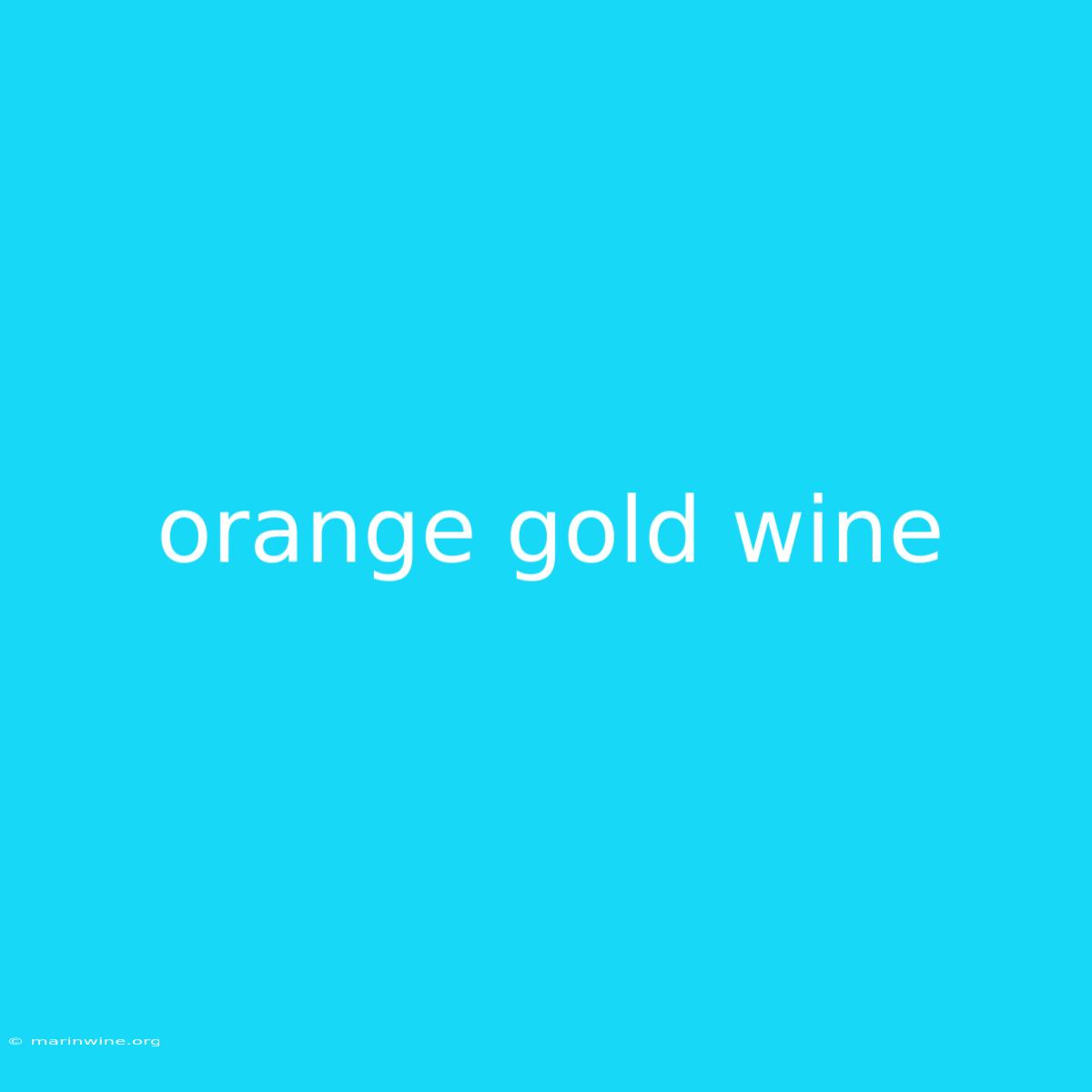The Rise of Orange Gold: A Wine Revolution in the Making
Have you ever heard of orange wine? It's not a type of juice, but rather a unique style of wine that's gaining popularity worldwide. This unconventional wine, known for its golden hue and intriguing flavors, is a fascinating blend of tradition and innovation.
Why This Matters: Orange wine is a captivating departure from the traditional red and white wine styles. Its production process, steeped in ancient techniques, is a testament to the ever-evolving world of winemaking. Understanding this unique wine category can broaden your wine knowledge and open doors to exciting new flavors.
Key Takeaways of Orange Wine:
| Feature | Description |
|---|---|
| Color | Golden, amber, or even copper, depending on skin contact time. |
| Flavor | A complex profile, often with notes of dried fruits, nuts, spices, and sometimes a hint of bitterness. |
| Production | White grapes undergo skin contact like red wine, resulting in a richer, more complex flavor. |
Orange Gold Wine: A Journey of Color and Flavor
The Art of Skin Contact
Orange wine production hinges on a crucial element: skin contact. Unlike traditional white wines where the grapes are pressed immediately, orange wines undergo extended skin contact. This process can last for days, weeks, or even months.
During skin contact, the grape skins release tannins, pigments, and other compounds that contribute to the wine's unique characteristics. These compounds are responsible for the orange hue and the complex flavor profile that distinguishes orange wine.
Key Aspects of Orange Wine:
- White Grapes: Orange wines are typically made from white grape varieties, including Sauvignon Blanc, Pinot Grigio, and Chardonnay.
- Fermentation: Fermentation can be carried out in stainless steel tanks or traditional clay amphorae, both of which contribute to the wine's character.
- Ageing: Orange wines may be aged in oak barrels or stainless steel tanks, depending on the winemaker's style.
The Flavors of Orange Gold:
The flavor of orange wine is diverse, ranging from fruity and floral to earthy and spicy. The extended skin contact contributes to a richer, more complex flavor profile, often showcasing notes of:
- Dried fruits: Apricots, peaches, raisins
- Nuts: Almonds, hazelnuts
- Spices: Cinnamon, nutmeg, ginger
- Floral: Orange blossom, honeysuckle
The Rise of Orange Wine:
Orange wine has witnessed a resurgence in recent years, largely driven by a growing interest in unique and unconventional wines. Winemakers are exploring innovative techniques and using different grape varieties to create distinctive orange wines, adding to the variety and depth of this intriguing category.
Orange Wine: A New World of Flavor
FAQ:
1. Is orange wine sweet?
Orange wines can range from dry to slightly sweet. The sweetness depends on the grape variety, fermentation process, and the level of residual sugar.
2. How long should orange wine be aged?
Orange wines can be enjoyed young, but some benefit from ageing. The extended skin contact lends complexity and depth that can develop further with time.
3. What should I pair with orange wine?
Orange wine can complement a variety of dishes, from grilled seafood and creamy cheeses to spicy Asian dishes and savory tarts.
4. Is orange wine a good choice for beginners?
Orange wine can be an adventurous choice for wine enthusiasts, but its unique flavor profile might not appeal to everyone. It's best to start with an orange wine from a reputable producer known for its quality and balance.
5. What are some of the most popular orange wine regions?
Orange wine is gaining popularity in several regions, including Slovenia, Italy, France, and the USA.
6. How do I know if an orange wine is good quality?
Look for wines from reputable producers who specialize in orange winemaking. Check online reviews and tasting notes to get an idea of the wine's quality.
Tips for Enjoying Orange Wine:
- Serve chilled: Orange wine is best served slightly chilled, between 45-55°F (7-13°C).
- Use appropriate glassware: A white wine glass or a tulip-shaped glass is suitable for showcasing the aromas of orange wine.
- Pair wisely: Consider pairing orange wine with dishes that complement its complex flavor profile.
- Be adventurous: Don't be afraid to experiment with different styles of orange wine and explore the diverse range of flavors it offers.
Summary of Orange Wine:
Orange wine is a captivating and unconventional style of wine that is gaining popularity worldwide. Its production process, involving extended skin contact, results in a unique golden hue and complex flavor profile. This article explored the key aspects of orange wine, its distinctive flavors, and the growing interest in this intriguing category. From its unique production methods to its versatile pairing options, orange wine offers a delightful journey of discovery for adventurous wine enthusiasts.
Closing Message:
The world of orange wine is a fascinating exploration of traditional winemaking techniques and modern innovation. Whether you're a seasoned wine connoisseur or just starting to explore the vast world of wine, embarking on a journey with orange wine promises a delightful experience filled with unexpected flavors and captivating discoveries.

